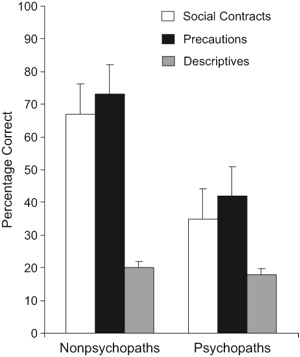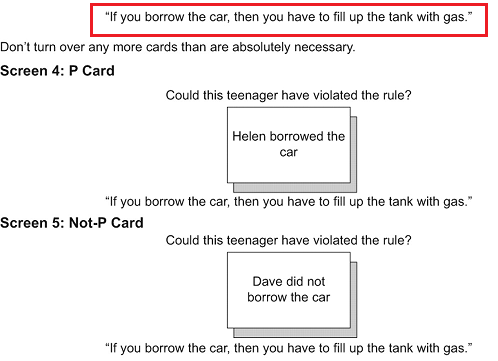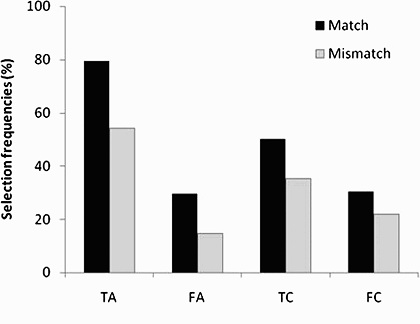December 21, 2010
Test of Psychopathy 2

no one picks the purple
(Part 1 here)

Review: psychopaths are worse at social contract and precautionary logic than are normals. But what mistake did they make? Did they all choose q? Not choose "not q?"
For that, we'd need access to the raw data. Fortunately, my writing partner, Elisa, is a female, and she was able to email the authors of the study to get the raw data.
And this is what she found:
Psychopaths are remarkably terrible at choosing what should be both the logical choice and the one the matching bias should have nudged them to choose anyway.
You might want to give psychopaths the benefit of the doubt-- maybe they just got overwhelmed by all of the choices?
No; in fact, their version of the test was easier than my version, above. They were shown each card independently, with a leading question:

It seems, well, obvious that if "Helen borrowed the car" there's a chance she could violate the rule by not returning it. The back of that card could say "returned it" or "didn't return it." By contrast, Screen 5 "Dave did not borrow the car" is pointless to choose.
But psychopaths don't see t like that. It seems that they read the question as "SINCE Helen borrowed the car, she is at least halfway honoring the rule"-- so she didn't violate it.
What we are coming to is not a fault in logic, per se, but a different understanding of what a rule is.
Part 3 soon
Each card has a color on one side and an alphanumeric symbol on the other.
Rule: If it is blue on one side, it is a 5 on the other.
Which card(s) do you need to flip over to test the rule?
I had said that most people don't get this question right-- the correct answer is p (blue) and "not q" (G).
However, most people do get the question half right. They mess up the "not q." Almost everyone picks p. And rarely does anyone pick "not p" (purple.)
Enter matching bias: people pick the choices that are actually written in the question, i.e. "blue" and "5." This can be exemplified by rewriting the question:
If it is blue on one side, it is NOT a 5 on the other.
Written this way, people still choose the blue and the 5, because those appear in the question.
Another example:
If it is blue...
is logically the same as
If it is not purple...
But the second way increases the rates of choosing purple, because "purple" is a match.
II.
Does it overwhelm logic? No.
 TA= true antecedent (p)
TA= true antecedent (p)
FA= false antecedent (not p)
TC=true consequent (q)
FC= false consequent (not q)
In all of the above examples, the purple card (FA) is wrong. Though it is chosen more often when it matches the question ("if the card is not purple...") it still is the least chosen card by far, because humans are generally good enough at logic to understand that to test the rule, the antecedent has to be true.
III.
So the situation is that people are typically bad at logic, but they are good enough to know that in order for the rule to be tested, p (the antecedent) has to be true.
Matching bias can affect choices, but even that isn't enough to extinguish p as the most commonly chosen answer. They may, or may not, also pick other choices (not p, q, not q, or a combination) but everyone picks p-- especially if it matches the question.
Everyone, that is, except psychopaths.
However, most people do get the question half right. They mess up the "not q." Almost everyone picks p. And rarely does anyone pick "not p" (purple.)
Enter matching bias: people pick the choices that are actually written in the question, i.e. "blue" and "5." This can be exemplified by rewriting the question:
If it is blue on one side, it is NOT a 5 on the other.
Written this way, people still choose the blue and the 5, because those appear in the question.
Another example:
If it is blue...
is logically the same as
If it is not purple...
But the second way increases the rates of choosing purple, because "purple" is a match.
II.
Does it overwhelm logic? No.
 TA= true antecedent (p)
TA= true antecedent (p)FA= false antecedent (not p)
TC=true consequent (q)
FC= false consequent (not q)
In all of the above examples, the purple card (FA) is wrong. Though it is chosen more often when it matches the question ("if the card is not purple...") it still is the least chosen card by far, because humans are generally good enough at logic to understand that to test the rule, the antecedent has to be true.
III.
So the situation is that people are typically bad at logic, but they are good enough to know that in order for the rule to be tested, p (the antecedent) has to be true.
Matching bias can affect choices, but even that isn't enough to extinguish p as the most commonly chosen answer. They may, or may not, also pick other choices (not p, q, not q, or a combination) but everyone picks p-- especially if it matches the question.
Everyone, that is, except psychopaths.

Review: psychopaths are worse at social contract and precautionary logic than are normals. But what mistake did they make? Did they all choose q? Not choose "not q?"
For that, we'd need access to the raw data. Fortunately, my writing partner, Elisa, is a female, and she was able to email the authors of the study to get the raw data.
And this is what she found:
- Descriptives (did not choose p): psychopaths 42% normals: 34%
- Precautions (did not choose p): psychopaths 38% normals:13%
- Social Contract (did not choose p): psychopaths 42% normals: 21%
Psychopaths are remarkably terrible at choosing what should be both the logical choice and the one the matching bias should have nudged them to choose anyway.
You might want to give psychopaths the benefit of the doubt-- maybe they just got overwhelmed by all of the choices?
No; in fact, their version of the test was easier than my version, above. They were shown each card independently, with a leading question:

It seems, well, obvious that if "Helen borrowed the car" there's a chance she could violate the rule by not returning it. The back of that card could say "returned it" or "didn't return it." By contrast, Screen 5 "Dave did not borrow the car" is pointless to choose.
But psychopaths don't see t like that. It seems that they read the question as "SINCE Helen borrowed the car, she is at least halfway honoring the rule"-- so she didn't violate it.
What we are coming to is not a fault in logic, per se, but a different understanding of what a rule is.
Part 3 soon
54 Comments